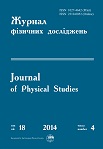DOI: https://doi.org/10.30970/jps.01.130
THERMALLY STIMULATED DEPOLARIZATION AND PIEZOACTIVITY IN PVDF-PZT COMPOSITES

|
Journal of Physical Studies 1(1), 130–133 (1996)
DOI: https://doi.org/10.30970/jps.01.130 THERMALLY STIMULATED DEPOLARIZATION AND PIEZOACTIVITY IN PVDF-PZT COMPOSITES |
 |
A. E. Sergeeva, S. N. Fedosov, A. M. Mirakyan, I. Taarig
Odessa State Academy of Food Technologies, Department of Physics
112 Kanatna Str., Odessa UA-270039, Ukraine
The results are presented on how electrization parameters and conductivity of a polymer matrix affect the thermally stimulated depolarization currents and piezoactivity of PVDF-PZT composites. The investigated composites contained a low-resistive (10 Ohm.m) and high-resistive (10 Ohm.m) polymer matrices. Piezoactivity was shown to be higher in low-resistive composites. It was found that the remanent polarization increased and the specific conductivities decreased with the electrization temperature increase. A decrease in conductivity is explained by a partial trapping of the charge carriers at the boundary of the polarized crystalites. The TSD current peaks were found to have been brought about by the relaxation of the unstable part of the polarization and the trapped space charge caused by the intensification of the molecular mobility at the boundaries between the polarized crystalites and the polymer. This leeds to a reduction of the depth of the traps and to a partial release of the charge carriers. Pyro- and piezoelecrtical properties of composites were retained in the samples subjected to the stimulated depolarization which indicates that thermostable residual polarization existed but was not exposed in the TSD experiments.